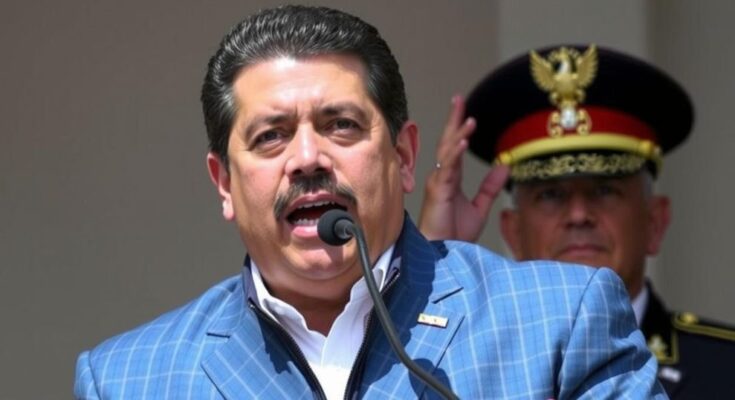Nicolás Maduro begins his third presidential term amid allegations of electoral fraud, with evidence from opposition leaders suggesting a clear victory by opponent González. International communities, including the United States, recognize González as the legitimate president-elect, while Maduro’s government enforces oppressive measures to maintain control. This political turmoil threatens democratic norms in the region.
On the first Friday of his third term in office, Nicolás Maduro, the President of Venezuela, affirmed his increasingly authoritarian governance amidst allegations of electoral fraud. His victory lacked any substantiated proof, following a pattern of previous elections mired in accusations of irregularities. For the first time, the opposition gathered significant evidence indicating that opponent González had decisively defeated Maduro, raising concern about the implications for democracy in the region.
The election has drawn sharp critique from observers, with some labeling it as the “largest electoral fraud” in contemporary Latin American politics. Voting center receipts collected by the opposition and corroborated by independent sources indicated a significant preference for González over Maduro. This situation prompted Carolina Jiménez Sandoval, leader of the Washington Office on Latin America, to warn that such actions set a “dangerous precedent” for democracies across the continent.
Despite widespread recognition of González as the legitimate president-elect by multiple nations, including the United States, Maduro’s regime ramped up its oppressive measures by restricting border access and heightening security with military assets. While some regional leaders opted to send representatives to the ceremony, they did not acknowledge the legitimacy of Maduro’s inauguration, further isolating his government and reinforcing Gonzalez’s stance among the international community.
As the Biden administration and other global leaders reassess their strategies towards Venezuela, it remains unclear whether they will continue to support the opposition or engage directly with Maduro, who has historically resisted international pressures. In recent discussions, some leaders have acknowledged the ineffectiveness of the previous maximum-pressure strategies in fostering stability within Venezuela, leading to calls for alternative approaches.
In light of the failed electoral promises and the suppression of opposition figures by Maduro’s regime, the opposition has nevertheless garnered significant support for González. Their data collection efforts revealed a clear majority against Maduro, revealing the complexities of Venezuela’s political landscape and the challenges facing international intervention.
Nicolás Maduro’s presidency has been characterized by increasing authoritarianism and controversy surrounding his electoral legitimacy. Since taking office, he has faced numerous accusations of orchestrating fraudulent elections. The current political climate in Venezuela is critical, as the opposition, led by González, asserts its claim to leadership based on strong evidence that challenges Maduro’s control. The global response to these events, particularly from Western nations, emphasizes the delicate balance of international relations, humanitarian issues, and domestic governance in Venezuela.
In conclusion, Nicolás Maduro’s recent inauguration marks a pivotal moment in Venezuela’s ongoing political crisis, following widespread allegations of election fraud and the apparent disenfranchisement of the opposition. Multiple nations have rallied around González, recognizing him as the rightful president-elect despite increasing threats from Maduro’s government. The situation exemplifies the challenges faced by global leaders in addressing authoritarianism and supporting democratic processes within Venezuela.
Original Source: www.washingtonpost.com




